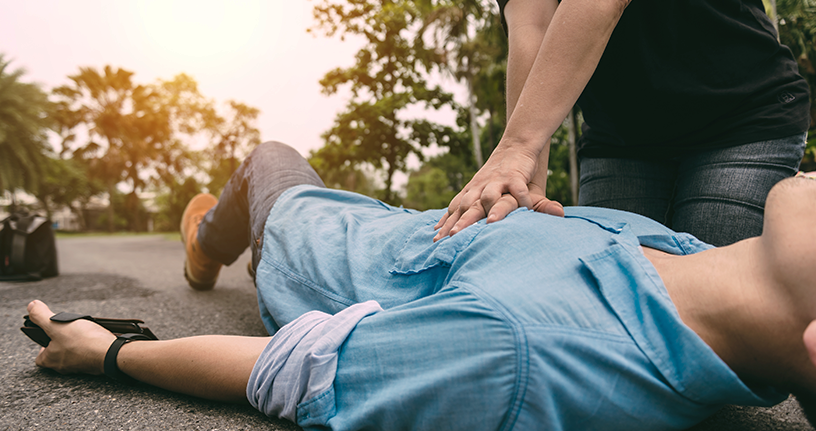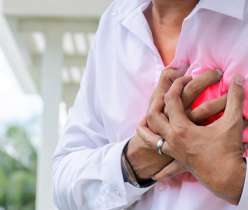Heart attack first aid includes precautionary steps. This information guide help you cope with this kind of stressful condition.
Cardiovascular Health and Diseases
Have you ever wondered about the heart’s never-ending workload, how it performs so well, for so long, for so many people? But, in some cases, it also fails to function due to a cardiovascular disease, known as cardiac disease (heart and blood vessel disease), brought down by a poor lifestyle, unlucky genes, and more. Heart diseases involve a range of conditions that affect heart health. These include:
-
- Coronary heart disease (disease of the heart’s blood vessels)
- Congenital heart disease, such as cyanotic disease where the child is born with heart problems)
- Arrhythmias (irregular heartbeat)
- Valvular heart disease (where or more if the valves in your heart don’t function properly)
Coronary heart disease and heart attack
Coronary heart disease is the most common form of heart disorders. It is the major cause of heart attacks. It develops when the arteries supplying blood to the heart get constricted or narrow, forming plaque buildup. Common coronary heart disease symptoms include breathlessness, chest pain, fatigue, and heart attack.
Heart attack, also termed myocardial infarction, is a condition that occurs when blood can’t flow toward the heart due to a blockage. This damage could result from long-term or gradual damage to the organ. This accumulation of fat and cholesterol, along with other substances, may result in plaque formation along the atrial wall of the heart. The formation of a plaque can rupture an artery and result in the development of a blood clot. Moreover, blood clotting and blockage can cause damage or destroy the heart muscles.
Coronary heart disease is the main cause of congestive heart failure (where the heart cannot pump enough blood as it should). Congestive heart failure symptoms include fatigue, weakness, irregular heartbeat, wheezing, shortness of breath, swelling in the belly area, reduced ability to exercise, and swelling in the legs, ankles, and feet.
A heart attack is one of the most common reasons people die suddenly. It is a medical condition when a specific part of the heart muscle does not receive enough oxygen and becomes numb. The heart attacks are mostly mild, and the concerned person can be easily saved by providing the appropriate treatment. But you can visit the doctor immediately after realizing the person has suffered a heart attack. Every minute is crucial for life, so you must know what can help during a heart attack. Before learning about heart disease first aid, let’s learn about heart disease symptoms.
Symptoms of heart attack
The warning signs of a heart attack may vary. Symptoms can begin suddenly or develop over time and get progressively worse. People may develop just one symptom or a combination of symptoms. The patients may experience pain or discomfort in the center of the chest. This pain may:
-
- Begin suddenly or begin slowly over minutes
- Be described as heaviness, tightness, fullness, or squeezing
- Be mild, moderate, or severe
- Spread to the throat, neck, jaw, back and shoulders, and one or both arms.
Atypical signs & symptoms
However, not all patients experience heaviness or squeezing. Patients having a heart attack may also experience:
-
- Shortness of breath
- Choking feeling in the throat
- Nauseous
- Cold sweat
- Heaviness in the arms
- Dizziness or faint
Only minimal heart problem symptoms may be explained by the elderly, women, people with diabetes, or chronic inflammatory conditions. The common symptoms such populations report include nausea, breathlessness, and arm or jaw pain.
First aid for heart attack
Heart attack is one of the major medical emergencies that one must attend to immediately. Learning about first aid for heart attack can help prevent serious complications and help you save lives.
What to do if a heart attack occurs?
The first aid one should take if you believe someone is experiencing a heart attack are as follows:
-
- Immediately call an emergency medical service because it is essential for treating a heart attack.
- Support the individual in finding a comfortable sitting position and help them remove any tight-fitted clothing that causes any restriction.
- Provide the individual with one chewable aspirin tablet if they are not allergic to it. It may reduce blood clotting and improve blood flow to the heart.
- Start CPR (cardiopulmonary resuscitation) immediately if the individual is unconscious and not breathing. It involves chest compressions and rescue breathing to maintain blood and oxygen flow to the brain and other important organs.
- Till aid arrives, be with the person and maintain their composure. Reassure them, show them support, and assure them they are not alone.
What not to do if a Heart attack occurs?
If someone experiences a heart attack, you should avoid doing the following:
-
- Do not panic: It’s important to remain calm, composed, and attentive at the same time to offer initial medical assistance.
- Leaving the person: Stick with the individual and support them until medical assistance arrives.
- Allow the person to drive the car or run to the hospital: Excessive movement can worsen heart stress and deteriorate the situation.
- Ignoring the symptoms: Do not presume the indications are merely a temporary bout of flatulence or heartburn. Take them seriously and consult a healthcare professional.
Tips to prevent heart attack
Heart attack prevention is crucial for high living standards and excellence. The following actions can help lower the risk of having a heart attack.
-
- Quit smoking and tobacco
- Regular exercise
- Have a healthy diet for heart
- Reduce your weight
- Take good sleep
- Stay away from stress
- Have regular health checkups
Summary
The person may have persistent chest pain, which may spread to their arms, neck, jaw, stomach or back. This pain occurs because a blockage stops blood flow towards the heart muscle. The pain is so intense that it will not ease with rest. The person may require immediate medical help as soon as possible. A heart attack may be very serious and require immediate medical help. Ensure that the person is comfortable; try to make them sit on the floor and lean against a chair or a wall. Sitting will ease the load on the heart. Sitting on the floor reduces their chances of hurting themselves if they collapse. Encourage the patients to immediately stop what they are doing and ask them to rest. Allow the patient to sit or lie down in a comfortable position.




